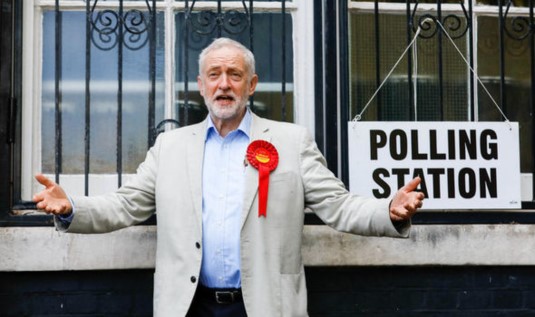
Yet for those paid to carp and crow, and others who like to advertise their deficit of political nous for free, Thursday was a complete disaster. Extrapolating the results nationwide - a foolhardy affair when different dynamics are in play in local elections - neither the Tories nor Labour would have enough seats to govern alone, and so the Liberal Democrats and the SNP come into coalition play. I'm sure you've seen/heard the mantra: "eight years into a Tory government and all we can manage are a handful of seats. With [insert centrist messiah here] at the helm Labour would be 20 points ahead and on course to beat Theresa May."
Let us utter a truth that seldom troubles political punditry. Unless local elections occur in the lead up to a bigger contest, like 2017's, large numbers of voters who trudge to the polls to elect a council don't always have national politics in mind. On Thursday, Labour was defending just shy of 2,300 seats compared to the Conservatives' 1,365. The former gained 77 and the latter lost 33, a loss somewhat cushioned by the collapse of UKIP's vote and the return of their voters to the Tory fold. Labour also went into the contest with 74 councils, and came out with the control of ... 74 councils. The Tories were defending 49 and lost three. In many areas Labour went into battle with the baggage of incumbency. Haringey of homelessness-is-a-price-worth-paying gentrification fame lost seven seats, in Derby Labour lost three seats and saw the council slide into no overall control, and Nuneaton and Bedworth were also lost. Yet these were made up elsewhere by gaining Tower Hamlets, Plymouth and Kirklees.
However, if we take the incumbency argument and generalise it to explain the depression of Labour's vote, that also means ignoring the not-bad results for the Tories. They did, after all, only drop three councils. Apart from a couple of special circumstances, like Barnet (though Labour's vote went up) and Pendle, their vote more or less held firm. Are they immune to localised weariness? No. Likewise, while I agree with Lewis that Labour doesn't have a compelling local council story to tell (once they get into office, too many Labour Council Leaders forget they're politicians and suddenly start acting like managers and accountants), neither do the Tories.
What to explain stasis? Yes, it might have something to do with our old friend polarisation. In case you've been reading nothing but mainstream comment since last year, the stark polarisation of the electorate around Labour and the Conservatives is an unavoidable fact of political life. It's confirmed time after time by polling and appears pretty resilient. Windrush, Tory in-fighting, and incompetence hasn't had an appreciable effect on Tory numbers. Likewise, the anti-semitism idiocies, Corbyn's refusal to kowtow to established conventions on war, the most vicious media assault ever unleashed on a British political leader, etc. haven't done anything to Labour either. The occasionally noted new features of politics, such as the fall out from Brexit, socially liberal vs illiberal values, the sharp age split between younger and in work vs the older and retired are symptomatic of movements and change in the guts of our society. Effectively, there are two political mainstreams.
A consequence of this is the big swings we used to see in "normal politics", of the party of government getting punished at second order elections, of poll shares taking a tumble when a party did something egregiously stupid or wrong, they're all gone. I like a good irony, and that political stability means electoral volatility while crisis begets stasis, if not paralysis, is one to savour. But that's what we have. British politics is logjammed for the foreseeable and voting goes back to being more of a turnout game, a la the 1950 and 1951 general elections. Unfortunately for the Tories, with years in government yet to go and a voter base in long-term decline, the deadlock has a much greater chance of breaking in Labour's favour.
The Blairites should be crushed and purged. Their media antics cost us tens of thousands of votes in these local elections. And they've been all over the airwaves since the results were announced pushing their false analysis of our electoral position.
ReplyDeleteLet's just get on with what we all know needs to be done.
Regrettably untrue. It would be Labour at its weakest point though. We would be ripe for another GE loss as soon as it happened. This can only be done by attrition, not revolution.
ReplyDeleteWhat is untrue? A polarised electorate? The bisection of it by changing class compositions, expressed as age and values effects?
ReplyDeleteI don't disagree that it would be possible for the Tories to still win an election. But we can only go on the trends we see at present, and all of them are flowing away from them.
A good analysis. Centrist armchair generals are fighting the last war. This quite blatantly is not the 1990s.
ReplyDeleteThe Right has a huge deadweight in the machinery of the party though, and it is constantly renewed as the media relentlessly attack the Left and careerist would-be politicos are encouraged to see a future in posing as the latest "Centrist" saviour. The social media are key to developing an alternative world in which Leftist politics can be debated, developed and seen as a valued alternative world. And this is not just a bubble - as Phil argues, there is a material base for it.
ReplyDelete"Let's just get on with what we all know needs to be done."
ReplyDeleteUpping our weak trolling game?
Trolling and censorship are being used to attack the space for developing alternative narratives.
ReplyDelete